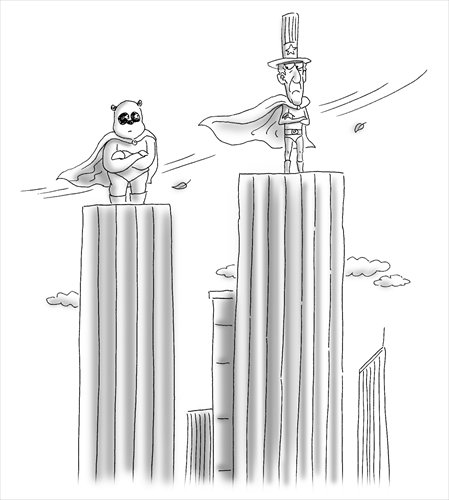HOME >> OP-ED
Future world order focus of Sino-US conflicts
By Ding Gang Source:Global Times Published: 2015-10-21 22:58:01

Illustration: Liu Rui/GT
I went to Atlanta, Georgia last week to attend the US-China Young Scholars Forum co-hosted by the Carter Center and the Global Times.
It was the first time for me to participate in discussions on Sino-US relations since I left the US more than a decade ago, which provided me with an opportunity to keenly feel the changes in Washington's perception of its ties with Beijing.
US scholars present at the forum unintentionally revealed more anxiety and misgivings compared with a decade ago, despite greater achievements in the development of China-US relations.
Though the "China collapse" theory was formulated in the US more than a decade ago, most scholars had a basic consensus that furthering bilateral ties between Beijing and Washington would definitely do more good than harm for both. As of now, it appears that nothing has ever changed to this agreement. Nonetheless, US scholars have gradually become increasingly suspicious about whether the advantages will outweigh the disadvantages by closing ranks with Beijing, mainly because they are afraid that China will inevitably challenge the US-dominated world order.
In the early years since China adopted the reform and opening-up policy in 1978, the White House applied an engagement policy to the Middle Kingdom. It was the correspondence between the two policies that facilitated the swift development of their bilateral ties.
Washington has also practiced a China policy of containment via weapons sales to Taiwan and the endorsement of human rights and democracy. It has applied both institutional and ideological countermeasures against China.
The US launched the engagement strategy largely because it believed creating favorable conditions for Beijing's opening-up program would prompt China to live up to its wishes, as was the case with Eastern European countries and former Soviet states.
However, Americans started to feel somewhat disappointed roughly a decade after the launch of China's reform and opening-up policy. Since the political incident in 1989 in particular, they have found that China did not take on changes as they wished, though the country actually changed a lot itself. So how should the US deal with such a China? A heated debate on this issue was once staged during Bill Clinton's tenure as president. According to the result, Washington has persisted in its policy of engagement interspersed with precaution measures in a bid to haul Beijing into the architecture of the US-led international order.
The year of 2008 constituted another turning point in Americans' thinking about China. While the Western world at large was mired in the worst-ever financial crisis since the Great Depression, China successfully hosted the 29th Olympic Games and displayed stunning strength and effective governing capacity in the relief effort for the catastrophic Wenchuan earthquake in the country's southwestern region.
Some US scholars affirmed that for a long time in the future China would not make the changes desired by Washington; therefore, the US must be prepared to cope with a country persevering in its own path. China has witnessed growing power since then. For a number of US experts, China's development has gone so far beyond their imagination that they are unable to control or lead it. With growing strength, Beijing will likely pose a challenge to the long-standing US-led world pattern and even overturn it one day. The existing international order is the foundation of safeguarding US interests, and its subversion means the US will lose its dominant role in a multitude of arenas including global politics, economy and finance.
That's why more and more US scholars are increasingly concerned about China's rise. According to them, the engagement policy has given China possibilities of development but meanwhile flunked in calling on the country to join the US-led global order. Consequently, the US must be fully ready to deter China from challenging the established international framework.
This issue will continue serving as one of the causes for a variety of contradictions between Beijing and Washington in the future. The more powerful China grows, the more projected the issue will become. It is hard to be the world's No.1 power but harder to be the No.2, which requires both countries to think of both their own position and the positioning of the other when tackling certain issues.
The author is a senior editor with People's Daily. He is now stationed in Brazil. dinggang@globaltimes.com.cn. Follow him on Twitter @dinggangchina
Posted in: Ding Gang, Viewpoint